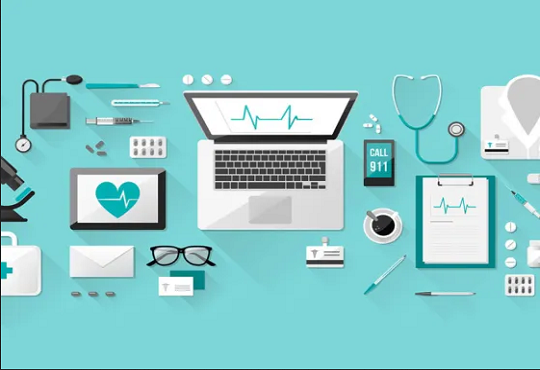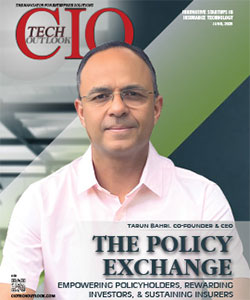Healthcare IT Landscape Reshaping Fast
Abhrasnata Das | Wednesday, 01 June 2022, 04:52 IST

The increasing adoption of technology by the healthcare industry may have been the silver lining of the pandemic. The global COVID-19 pandemic led to an upsurge in technologies for disinfecting, limiting transmission, detecting disease spread, as well as for treatment, patient management, and immunization. The advancements in healthcareIT range from e-consultations, telemedicine, real-time diagnosis to accessing digital therapeutics provided by immersion technology tools.
Today, a range of advanced technologies like, artificial intelligence, internet of medical things, telemedicine, big data & analytics, immersive technology, mobile health, 3d printing, blockchain, cloud computing, genomics, etc are revamping the operation line of the healthcare segment. In the coming days, these solutions will enhance the workflows, staff scheduling and provide connected infrastructure, devices, and systems to accelerate accurate and equitable clinical services. In this article, let's take a sneak peek at the key trends that are expected to play a significantly critical role in shaping the healthcare technology of tomorrow.
AI to replace Labor-intensive Care
Artificial intelligence in medicine already has a significant impact on healthcare practices throughout the world. Appointment scheduling, translation of clinical facts, and patient history monitoring are among the innovations. Today, AI is allowing healthcare institutions to automate more time-consuming and delicate activities. Intelligent radiology equipment, for example, can recognise important visual indicators, saving hours of intensive investigation. Appointment scheduling, patient tracking, and treatment recommendations may all be automated with other automated systems.
Effective implementation of AI can also open the avenue for real-time data collection. With faster collection of critical data, the hospitals can take faster critical clinical decisions.
AI can go a long way in helping the firms in taking faster clinical decisions. At Max, we are increasingly implementing AI for diagnostics, wherein we are leveraging AI to study x-ray, ct-scan, brain volumetric analysis, to decipher whether the report is fine from a safety standpoint or does it require further investigation,” says Sumit Puri, CIO of Max Healthcare to ET.
Today, Al is also used for faster disease detection and an Indian firm named – Artelus has developed an AI-powered solution that can detect diabetic retinopathy (DR) with high accuracy in under three minutes, which is faster than a human professional. The startup also works on the detection of early tuberculosis, breast and lung cancer.
Internet of Medical Things (IOMT) and Smart Care
IoMT is critical for the development of devices that deliver healthcare services with little or no human involvement. Multiple applications are enabled by connected medical devices, equipment, and infrastructure, including automated disinfection, smart diagnostics, and remote patient management, to mention a few. Cognitive IoMT (CIoMT) is a new trend that combines sensory data, autonomous processing, and network connectivity for real-time illness diagnosis, monitoring, tracking, and control.
“IoMT is redefining the way hospitals work and helping healthcare services to move from hospitals to home. The ongoing pandemic accelerated the need for remote patient monitoring and usage of IoMT in ambulatory and home care, leading to a boom in teleconsultations and monitoring, which reduced the number of in-hospital visits consequently reducing contamination,” states Ashwini Prakash, managing partner, Asia Pacific Lead – Pharma, Life Sciences, & Healthcare and Consumer Products, Stanton Chase India.
Telemedicine And Remote Care
Around the world, many governments, healthcare systems, professionals, and patients have embraced telemedicine as a result of the COVID-19 epidemic. Governments established telemedicine recommendations to decongest healthcare institutions in order to combat the epidemic. As medical practitioners communicate with their patients via telecommunication, telemedicine lessens the strain on facilities and the usage of personal protective equipment (PPE). HealthTech businesses are developing telehealth services that increase social distance and so enhance public health mitigation methods. Telemedicine also helps to support elderly persons remotely, saves healthcare resources, and decreases bed space.
“Telemedicine has become a fundamental piece of the Indian healthcare system. With the increasing public appetite for healthcare options that offer a safe and convenient method of seeking care, telemedicine has seen a sharp rise,” says Kanav Kahol CEO, DIVOC Health.
The field of telemedicine is also witnessing massive innovation and many startups around the globe are introducing advanced technology. For example - An Estonian startup, Viveo Health has come up with a fully working, end-to-end telehealthcare platform that bridges insurance and healthcare. The startup provides an online doctor consultation platform for clinics, doctors, patients, and companies. It allows users to communicate with healthcare providers through video calls, as well as book appointments. The platform also allows users to receive medical advice, e-prescriptions, or e-referrals directly from doctors by using the app.
The Path Forward
While there are risks and challenges, it is clear that robotics and AI bring huge benefits to the global healthcare ecosystem. The Internet of Medical Things and AI-driven tools have recorded significant success, especially in human lives. With AI, we are now better aligned with conscious health management and an overall healthy lifestyle.
In the days to come, novel technologies Augmented Reality, Virtual Reality, immersive technology, mobile health, 3d printing, blockchain, cloud computing, genomics are more likely to transform the healthcare industry into a robust space.




